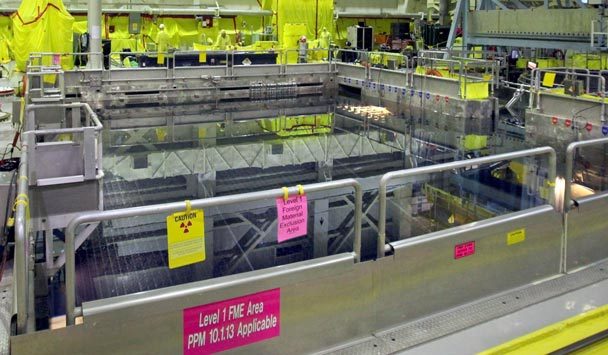forum
library
tutorial
contact

Contractor Sues Energy Northwest
by Annette CaryTri-City Herald, November 12, 2011
|
the film forum library tutorial contact |

|
Contractor Sues Energy Northwestby Annette CaryTri-City Herald, November 12, 2011 |
 The contractor hired to replace the condenser at the Columbia Generating Station has sued, claiming it's Energy Northwest's fault that the work took far longer than scheduled.
The contractor hired to replace the condenser at the Columbia Generating Station has sued, claiming it's Energy Northwest's fault that the work took far longer than scheduled.
Babcock & Wilcox Nuclear Energy filed the breach of contract lawsuit in U.S. District Court. It claims that Energy Northwest failed to reveal important information about the work, costing B&W about $50 million.
"We have some differences of opinion regarding the facts," said Rochelle Olson, Energy Northwest spokeswoman. "We will defend our position in the best interests of the Northwest ratepayers."
B&W had a $33 million contract to replace the 26-year-old condenser at the nuclear power plant near Richland this spring. The condenser turns steam generated by boiling water in the reactor back into water for reuse in the plant.
The outage for partial refueling of the plant and the condenser replacement was planned to last about 80 days, the longest planned refueling outage in the plant's history. B&W's contract gave it 53 calendar days for the condenser replacement.
Instead, work dragged on to replace the condenser and the reactor did not reconnect to the Northwest power grid until late September. The outage lasted about 175 days, and Bonneville Power Administration estimated the net cost of the extended outage at about $60 million.
The design documents that B&W was given to do the work were incomplete or inadequate, B&W said in its federal complaint.
More demolition was required than anticipated to remove hot well supports beneath the condenser false floor, the complaint said. There also were substantial structural distortions in the condenser shell that required extensive efforts to strengthen the shell and to fit the new condenser modules inside it, it said.
B&W also found different conditions than Energy Northwest described before bids were made for the work, the complaint said.
"The extent of radiological contamination in the work environment was far more extensive than had been disclosed ... or that should have been reasonably expected based on industry norms for a boiling water reactor condenser," the complaint said.
An Energy Northwest ventilation system to handle airborne contamination needed constant repairs and led to work stoppages, the complaint said.
Because of the inadequate ventilation and radiological contamination, workers needed to wear double protective suits, full face masks and respirators, which reduced productivity, the complaint said.
Lack of adequate maintenance and failing to operate the plant effectively caused additional problems, the complaint said.
Energy Northwest failed to properly shut down systems for B&W's work, resulting in a hydrogen explosion during demolition of the condenser and a stop to the work, the complaint said.
B&W had planned to use some existing plant equipment for lifting during the work, but found that Energy Northwest had failed to maintain it, the complaint said. Inspections, repairs and tests were done by B&W.
Energy Northwest also required work to be done based on specific sequences and steps, increasing the time and cost to do the work, the complaint said.
B&W brought more workers and management onto the project to accelerate work and catch up at Energy Northwest's direction. However, Energy Northwest did not increase the contract pay to compensate for problems or the extra work, the complaint said.
Olson declined to discuss the case in detail, saying "further public comment on B&W's breach of contract could hamper our efforts to resolve issues between us."
However, as the outage dragged on over the summer, Energy Northwest discussed problems with its board members and the Herald.
Within the first week of the outage, B&W submitted a revised work schedule and by early August had turned in three more, Energy Northwest officials said then.
In June, Energy Northwest officials were saying B&W's problem was inadequate planning and preparation, and although there were some production improvements, the work did not achieve the momentum needed by August, they said.
Management problems persisted in areas of quality and safety, according to Energy Northwest.
About four months into the outage, Energy Northwest said it had mandated repeated work stoppages over concerns about industrial safety and risk to the contractor's workers. Then they totaled a combined 20 days without work.
Problems included workers not wearing gloves and cutting their hands, and repeated cases of heavy loads being dropped, Energy Northwest said earlier.
At one point, Energy Northwest hired an alternate contractor to do some welding because of the pace of the work, and that contractor was able to maintain quality standards with three to five times the productivity, Energy Northwest said in August.
Related Pages:
Community Vital to Hanford Cleanup by Matt McCormick and Stacy Charboneau, Tri-City Herald, 4/34/11
learn more on topics covered in the film
see the video
read the script
learn the songs
discussion forum
